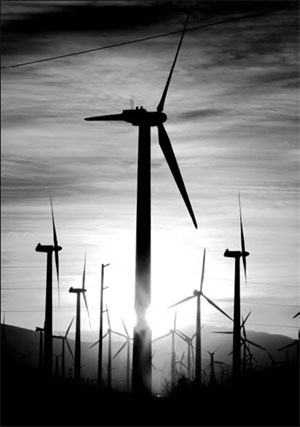Wind farms spread footprint in US
At 80.7m tall, four gleaming white wind turbines tower over the tiny farm town of Rock Port, Missouri, like a landing of alien intruders.
But despite their imposing presence and the stark contrast with the rolling pastures and corn fields, the turbines have received a warm welcome here.
As Eric Chamberlain, who manages the wind farm for Wind Capital Group, eats lunch in a local restaurant, local people greet him with a "Hey Windy!" and many say they are happy to be using clean electricity.
"It doesn't pollute the environment, it provides tax revenue, creates jobs. I don't see a downside," said Chamberlain, who is something of a celebrity in this town of 1,400 people.
|
The sun rises over a windmill farm in Palm Springs, California, in this 2005 file photo. Reuters |
While growth in ethanol use as an alternative fuel has had a big impact on rural America, wind power has also been growing steadily for the past three years, with wind farms like this one springing up all over the windy expanse of the Great Plains and beyond.
While only 1 percent of US electricity comes from wind, it is attracting so much support these days that many in the industry believe it is poised for a growth spurt.
"These are pretty heady times," said Randall Swisher, executive director of the American Wind Energy Association.
"People are finally starting to see the data about what is happening to the world's climate and that is really having an impact," said Swisher.
Last year, a record 3,100 turbines were installed across 34 US states and another 2,000 turbines are now under construction from California to Massachussetts. In all, there are more than 25,000 US turbines in operation, an investment of $15 billion.
On May 12, the US Energy Department said wind power could provide 20 percent of US electricity by 2030, or 304 gigawatts, up from the current 16.8 gigawatts. Achieving that will require that wind turbine installations rise to almost 7,000 a year by 2017, the department said.
The industry appears poised to comply.
In March, GE Energy announced it had secured a $1 billion deal to supply 750 megawatts of wind turbines - enough to power about 200,000 households.
In April, Nebraska officials broke ground on a wind farm that would be the largest in that state, providing power for an estimated 25,000 homes.
And, this year, Kansas became the first state in the nation to reject expansion of coal-fired plants specifically because of global warming worries.
Wind Capital, based in St Louis, Missouri, is a relatively small player. It operates three wind farms in Missouri and has plans for projects in 10 US states.
The firm leases land from farmers on which to build its turbines. In Rock Port, homes and businesses getting power from the municipal utility are now using wind energy, backed by conventional electricity supplies from the Missouri Joint Municipal Utility system.
Increasingly, states are mandating that utilities obtain a portion of their power through such renewable sources. Wind energy is also benefiting from a Production Tax Credit federal subsidy of 2 cents per kilowatt hour of electricity produced.
According to the American Wind Energy Association, this amounts to $4.5 billion over 10 years.
That is still far less than the $3.57 billion in annual subsidies enjoyed by the ethanol distillers under a 51 cents per gallon Ethanol Excise Tax Credit.
Supporters say along with helping the nation break a dependence on costly oil, natural gas and coal, they see wind energy as part of a base for "green-collar" employment, with jobs in manufacturing towers, blades and other components.
Agencies
(China Daily 05/20/2008 page23)















